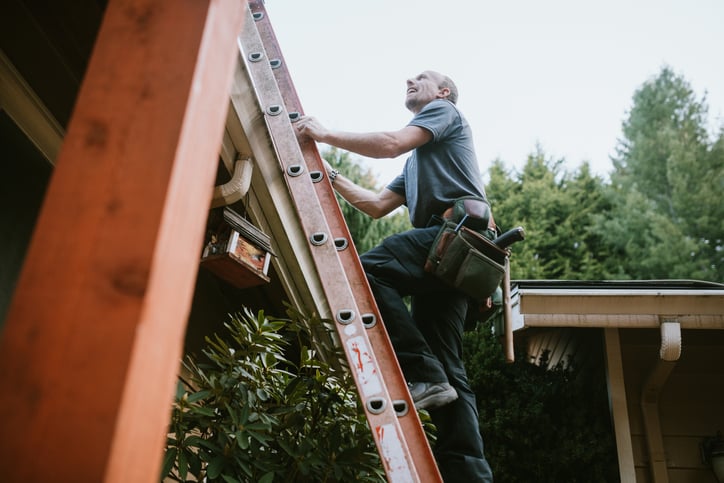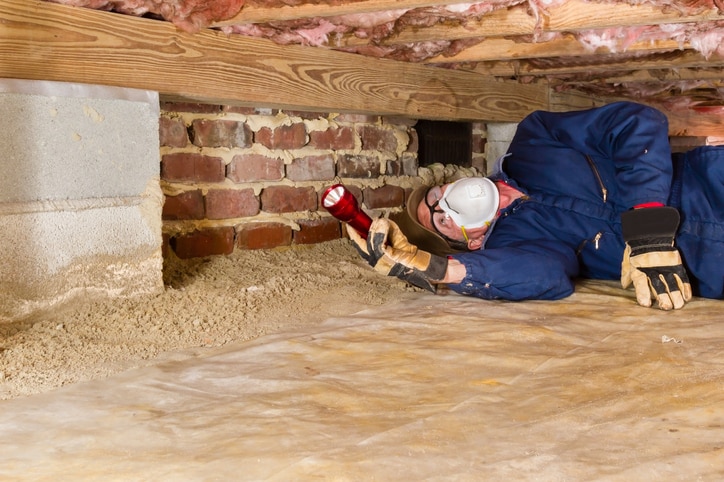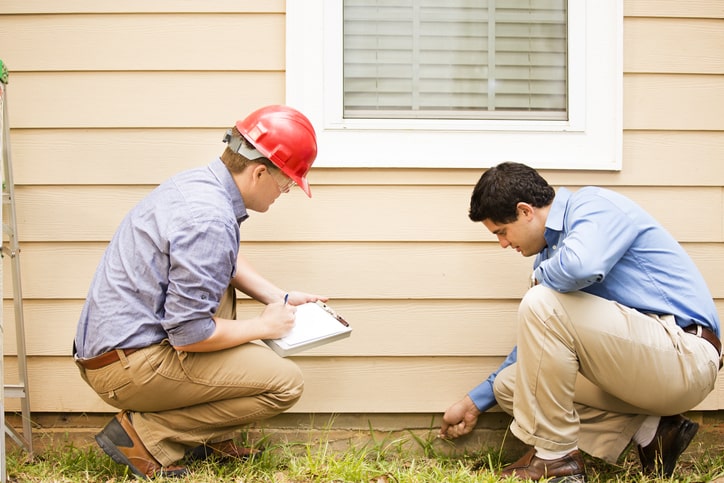Finding your dream home can sometimes feel like a nightmare. After sifting through misleading Zillow posts and dealing with rejected offers, the last thing you want when you finally find a house you love is hearing bad news after the home inspection.
But since home inspections are necessary, let’s look at the bright side: They can save you hundreds of thousands of dollars and years of stress and frustration.
Keep reading this checklist to learn:

A home inspection is a detailed walk-through of your potential home and is a necessary step in the home buying process.
After a homebuyer makes an offer on a house and the seller accepts that offer, the buyer will almost always get a home inspection. (Most mortgage loans, including FHA loans, are actually contingent on receiving a full, professional home inspection.)
In a home inspection, a professional home inspector will go over every nook and cranny of the new home and give the buyer a list of major problems, safety issues, and warning signs. After receiving the inspection report, the buyer can work with their real estate agent to decide if they want to proceed with the purchase, request repairs or credits, or abandon the sale completely.
The buyer typically pays for the inspection. Sellers can get a pre-sale inspection to show potential buyers that the home is in good condition, but most buyers won’t (and are advised not to) accept a seller-commissioned inspection report.
You need to be present at the home during the home inspection to let the home inspector in. Whether or not you need to stay on the property is up to you, but attending gives you a good chance to walk through the house yourself and ask questions along the way. It’s especially recommended for first-time home buyers to attend their home inspection so that they can learn as much as possible about what looks good and bad in a home.

Home inspection costs vary, but you can expect to pay between $300 and $500. Home inspections typically take between two and four hours.
Every home inspector will have their own process, but here’s what they’ll be looking at.
Keep in mind that this is just a summary of what they’ll be inspecting and is not a stand-in for an actual home inspection.
Imagine moving in only to find out that the heating system or cooling system isn’t functioning properly.
To ascertain that they are, your inspector will check out the air flow on vents, make sure the air conditioning unit is in good condition, ensure that the ductwork is in good shape, and that there are no odors.
Your inspector will check out all visible interior plumbing pipes and faucets for signs of leaks or rust. They’ll also look at the water heater for signs of rust and proper ventilation, and they’ll make sure it’s the right size for the house.
Ensuring that all electrical systems are in good shape are of paramount importance, so they’ll check out all visible wiring. If you’re in an older home, they’ll note if the house has knob and tube wiring, which can cause problems.
They will also inspect the electrical panel to make sure that the fuses and breakers aren’t overheating, that all the cables are attached properly, and that it’s the right size for the home.
They’ll test the electrical outlets and light switches in each room as well.
The home inspector will get up on the roof and check out the shingles for all signs of damage or other issues, including broken or missing shingles, cracking, cupping, curling, extra layers of roofing, mold, or rot.
At this point, they’ll also look at the gutters and the chimney (if there is one). Gutters need to be cleaned out and in good condition and not rusted and securely attached to the roof. Chimneys must be straight, not leaning, without cracked bricks or joints.
They will also inspect the attic and crawl space if the house has them.

In the attic, they’ll want to see that there is no evidence of water damage from the roof, and that there is proper insulation and ventilation.
The crawl space needs to be vented and insulated with no evidence of insect infestation or water damage.
An inspector will be well-versed in foundation issues and will look for signs of foundation settling or sinking throughout the inspection. They’ll also look for cracks on the exterior walls of the foundation and the interior, if there is a basement.
They’ll also look at the sides of the house to make sure the walls and foundation are not sagging, bowed, or bent. Any of those three are signs of foundation problems, like the house settling into the ground below.
Major foundation problems can be a deal-breaker for many homebuyers, but if you’re really in love with a home with foundation issues, there are still options for you.
Walls, ceilings, and floors can be great indicators of minor problems and major structural issues alike.
In all rooms, your home inspector will ensure that they are all straight and level and without stains or cracks. (Major cracks in the wall can indicate that house settling.) They’ll also want to see that windows and doors open and latch easily and that windows aren’t painted shut.
In the kitchen, they’ll look for a working exhaust fan, grounded electrical outlets near the sink, functioning appliances, and that the cabinets are in good condition.
In the bathroom, they’ll make sure that there is a working exhaust fan, that each fixture and faucet has adequate water pressure, that the sink and tub/shower drain properly, and that the toilet is in good condition.
The home inspection also happens outside! In addition to making sure the exterior walls are straight, they’ll look for cracks, chips, or dents in siding, stucco, and bricks. They’ll also make sure that the paint isn’t flaking or blistering.

If it’s recently rained, they should be able to tell if there is good drainage that leads the water away from the house; on the other hand, they may find signs of standing water.
Inspectors will also look at attached and detached garages, sidewalks, patios, and driveways.
Think of a home inspection as a check-up at the doctor: They’ll look for obvious issues, but they can’t detect anything that’s hidden from plain sight.
That means things that below the ground or behind the walls aren’t covered. A home inspection won’t look check for radon, termites and other pests, mold, asbestos, or other hazards. They also won’t be able to look at a septic tank or below-ground plumbing. Pools are also not typically covered.
Some inspectors may be able to point out child safety issues or where things aren’t up to local code, but that may depend on their personal experience with those issues and they aren’t typically included as a matter of practice.
After your home inspection, you’ll receive a home inspection report, which is an extensive and detailed report on the condition of the home. It will have summaries of each category and each specific instance. It will also give you estimates on how long major parts of the house (like the roof, foundation, paint, appliances, HVAC, and plumbing) are likely to last.
Lastly, you’ll get a list of recommended repairs and replacements for the things the inspector finds wrong. You and your Realtor can use this information to decide if you want to request repairs from the seller, renegotiate your offer price or closing costs, or walk away from the deal altogether.
A good home inspector is worth their weight in gold, but choosing your inspector can be overwhelming.
First, ask friends, family, or neighbors who they used for their home inspection. If they were happy with their inspector, that’s a great sign.
There are many inspection companies out there, but it’s recommended to find one that is a member of the American Society of Home Inspectors (ASHI). ASHI has membership standards for inspectors and inspectors must pay to be a member, meaning most people in the organization are serious about their job.
You’ll want to find someone that’s qualified, with several years of experience under their belt. You should be able to ask potential inspectors for a sample inspection report as well.
Call Helitech today to diagnose the full extent of the damage and prevent major emergencies that won’t drain your bank account.